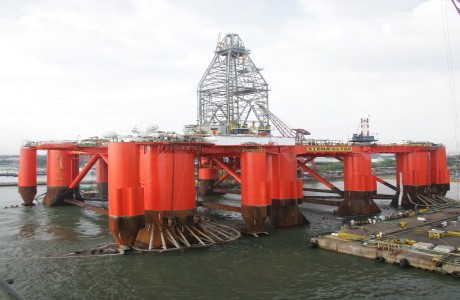UK-based oil explorer Tullow Oil plans to spend up to $750 million (466 million pounds) jointly with its partners in exploration and further drilling in Uganda this year as the east African country races to begin crude production.
Eoin Mekie, Tullow’s Uganda country manager, said the firm also expects to get its first production licence by the close of this year as they proceed with appraisal drilling to determine the size of their oil wells after initial discovery.
In February, Tullow, France’s Total and China’s CNOOC completed their long delayed $2.9 billion partnership venture that gave each of them a one third stake in Tullow’s five Uganda exploration blocks.
“The three partners this year will spend something in the region of $650 to $750 million,” Mekie told Reuters in an interview on Wednesday.
“And this money will be spent on drilling, on appraisal, development, seismic acquisition, studies etc.”
Mekie said this year’s planned investment was part of the $10 billion that the three companies expected to spend before Uganda’s oil sector goes into full-scale production phase.
Commercial oil production in Uganda is likely to begin in 2014 with full-scale output seen around 2020, he said.
Uganda discovered commercial hydrocarbon deposits along its border with the Democratic Republic of Congo in 2006, and Tullow says reserves of 1.1 billion barrels are confirmed in place and believes there are a further 1.4 billion barrels left to find.
The government says 2.5 billion barrels of oil are confirmed, of which between 1 billion to 1.2 billion barrels are recoverable.
“We have applied for the Nzizi production licence (in Block Two operated Tullow) … there’s a lot of information that government is studying. In the course of this year we hope to get our first production licence,” he said.
The firm, however, hopes to start supplying some crude, accumulated in exploration and appraisal drilling, to Ugandan industries later this year.
He said London-listed Tullow was now accelerating plans to cross-list its shares on the Ugandan bourse after a protracted tax dispute with the government delayed the process.
“Now that we have the partnership up and running, I think you will see cross-listing plans firm up over the course of this year but finalisation is likely next year,” he said.
The tax row ensued after Tullow was appointed as a tax agent for its former partner, Heritage Oil.
Heritage, whose sale of its 50 percent stake in two exploration blocks to Tullow for $1.45 billion was completed in July 2010, argued proceeds from the deal were not subject to taxes. A Ugandan tribunal has ruled the company is liable to pay $404 million in capital gains tax.
On plans by Uganda to build a refinery, Mekie said a capacity exceeding 60,000 barrels per day (bpd) would make the refinery unviable because Uganda would not find enough regional market to buy the fuel.
Uganda is eyeing a refinery that begins with a capacity of 20,000 bpd, enough to meet local demand, to be ramped up to reach a peak capacity envisaged at 200,000 bpd to meet international demand.
“… our view is that it would be difficult to secure financing (for a refinery of 200,000 bpd) because it’s a very competitive market for funds,” Mekie said.



